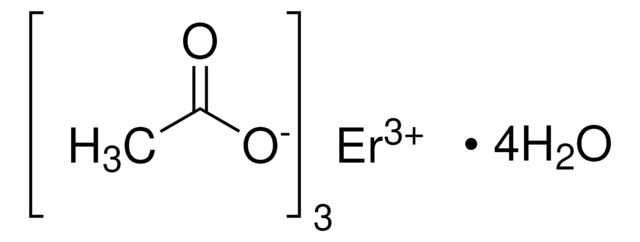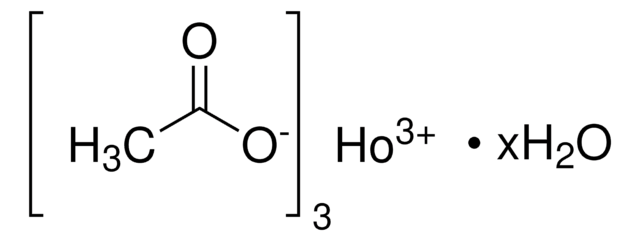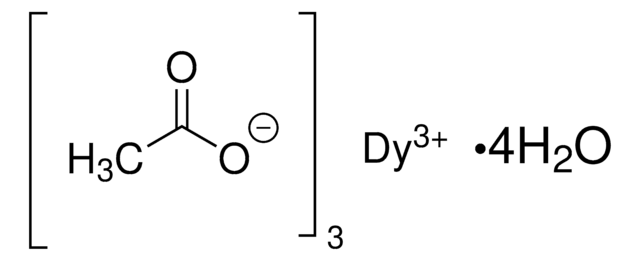367702
Thulium(III) acetate hydrate
99.9% trace metals basis
Synonym(s):
Thulium(III) acetic acid salt hydrate
Sign Into View Organizational & Contract Pricing
All Photos(1)
About This Item
Linear Formula:
(CH3CO2)3Tm · xH2O
CAS Number:
Molecular Weight:
346.07 (anhydrous basis)
MDL number:
UNSPSC Code:
12161600
PubChem Substance ID:
NACRES:
NA.22
Recommended Products
Assay
99.9% trace metals basis
form
powder
reaction suitability
core: thulium
reagent type: catalyst
SMILES string
O.CC(=O)O[Tm](OC(C)=O)OC(C)=O
InChI
1S/3C2H4O2.H2O.Tm/c3*1-2(3)4;;/h3*1H3,(H,3,4);1H2;/q;;;;+3/p-3
InChI key
GKCQSJXCECKBHO-UHFFFAOYSA-K
General description
Thulium(III) acetate hydrate is a chemical compound containing the rare earth element thulium. It can be used as a precursor in the synthesis of core-shell nanocrystals.
Storage Class Code
11 - Combustible Solids
WGK
WGK 3
Flash Point(F)
Not applicable
Flash Point(C)
Not applicable
Certificates of Analysis (COA)
Search for Certificates of Analysis (COA) by entering the products Lot/Batch Number. Lot and Batch Numbers can be found on a product’s label following the words ‘Lot’ or ‘Batch’.
Already Own This Product?
Find documentation for the products that you have recently purchased in the Document Library.
Customers Also Viewed
Yuejiao Xian et al.
PloS one, 15(4), e0221180-e0221180 (2020-04-23)
At the molecular level, the circadian clock is regulated by a time delayed transcriptional-translational feedback loop in which the core proteins interact with each other rhythmically to drive daily biological rhythms. The C-terminal domain of a key clock protein PER2
Synthesis of core-shell lanthanide-doped upconversion nanocrystals for cellular applications
Ai X, et al.
Journal of Visualized Experiments, 129, e56416-e56416 (2017)
Qianqian Su et al.
Frontiers in chemistry, 8, 836-836 (2020-10-24)
Lanthanide-based upconversion nanoparticles can convert low-energy excitation to high-energy emission. The self-assembled upconversion nanoparticles with unique structures have considerable promise in sensors and optical devices due to intriguing properties. However, the assembly of isotropic nanocrystals into anisotropic structures is a
Shihua Li et al.
ACS nano, 13(2), 2103-2113 (2019-01-16)
The exploitation of gas therapy platforms holds great promise as a "green" approach for selective cancer therapy, however, it is often associated with some challenges, such as uncontrolled or insufficient gas generation and unclear therapeutic mechanisms. In this work, a
Syue-Liang Lin et al.
Nanomaterials (Basel, Switzerland), 10(10) (2020-10-21)
Several robust titania (TiO2) coated core/multishell trivalent lanthanide (Ln) upconversion nanoparticles (UCNPs) hybrid architecture designs have been reported for use in photodynamic therapy (PDT) against cancer, utilizing the near-infrared (NIR) excited energy down-shifting and up-conversion chain of Nd3+ (λ793-808 nm)
Our team of scientists has experience in all areas of research including Life Science, Material Science, Chemical Synthesis, Chromatography, Analytical and many others.
Contact Technical Service

















